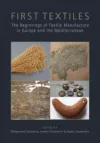
First Textiles
3 contributors - Paperback
£35.00
Agata Ulanowska is an Assistant Professor in the Faculty of Archaeology, University of Warsaw. Her research interests focus on the Bronze Age Aegean, textile production and technology, especially textile tools, experimental archaeology, and Aegean seals, and sealing practices in relation to textiles and textile production. She was awarded with two grants of the National Science Centre of Poland, for the projects: “Textile production in Bronze Age Greece – comparative studies of the Aegean weaving techniques” (2015–2017) and "Textiles and Seals. Relations between textile production and seals and sealing practices in Bronze Age Greece” (2018–2021). She is a chair of the COST Action CA 19131 “EuroWeb. Europe Through Textiles: Network for an integrated and interdisciplinary Humanities”.
Karina Grömer is the head of the Department of Prehistory, Natural History Museum Vienna. She studied Prehistoric Archaeology, Ethnology and Anthropology at the University of Vienna in Austria. Habilitation thesis: “Archaeological Textile Research - Technical, economic and social aspects of textile production and clothing from Neolithic to the Early Modern Era”. She is specialised on interdisciplinary and integrated analysis of textiles, research on textile tools and reconstruction of prehistoric costume. Her research covers a time-span from c. 2500 BC till 1000 AD and a geographical area from Central Europe to Iran (research projects e.g. “DressID - Clothing and Identity in Roman Empire”, “CinBA – Creativity in the Bronze Age” and “Chehrabad Saltmummy & Saltmine Exploration Project”, “EuroWeb. Europe Through Textiles: Network for an integrated and interdisciplinary Humanities”). She is also teaching at the Universities Vienna (Austria) and Southampton (Great Britain).
Ina Vanden Berghe is leading the Textile Research Unit at the Laboratory Department of the Royal Institute for Cultural Heritage (KIK-IRPA) in Brussels. She specialises in the study of materials, techniques and degradation aspects of organic materials. Her main research activities relate to natural and synthetic organic dye and protein identification (amino acid based) with chromatographic, spectroscopic and/or microscopic techniques. Besides, she is also experienced in the study of metal thread and plant fibre identification. For the Leather, Paper and Parchment Research Unit at KIK-IRPA, she covers the research on organic dye/pigments and on the (cellulosic or proteinaceous) primary material. Her special interest however goes to the field of archaeological textiles and the degradation problems related to various burial and preservation conditions. She has participated in several research projects such as “MODHT – Monitoring of the Damage in Historic Tapestries”, “DressID – Clothing and Identity in Roman Empire’, “Eu–Artech – Access, Research and Technology for the Conservation of the European Cultural Heritage”; “Charisma – Cultural heritage Advanced Research Infrastructures: Synergy for a multidisciplinary approach to conservation/restoration” and “Iperion – Integrated platform for European research infrastructures in the field of cultural heritage”.
Magdalena Öhrman is Senior Lecturer in Classics at the University of Wales Trinity Saint David. Trained as a Classical Philologist in Sweden and Germany, her current research interests are in the area of Graeco-Roman textiles and textile production, textile terminology and technology, and in sensory experience in past societies. She held a Marie Skłodowska Curie fellowship at the Centre for Textile Research (University of Copenhagen) in 2016-2018 for the project "Textile Reflections: Multi-Sensory Representation of Textile Work in Latin Poetry and Prose".